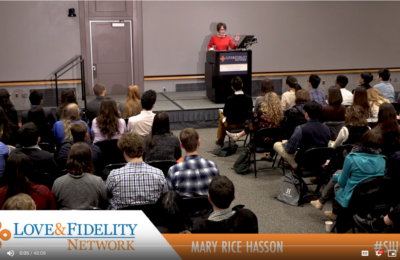#MeToo shows the dangers of ‘end-less’ sex. ‘Humanae Vitae’ shows the way forward.
April 23, 2018 | Published first in America Magazine | The Jesuit Review
In our astonishing cultural moment, people—and not just those in gender studies departments—are engaged in serious conversations about sex and power. One interpretation of the #MeToo phenomenon is that sexual harassment is not about sex at all but only power. There is truth in this view. The power dynamics in film producer Harvey Weinstein’s room, for example, clearly made all the difference in determining how women responded to his unwanted advances.
Interestingly, the view that sexual harassment is not primarily about sex is put forward more often by women than by men. Male commentators, such as the New York Times columnist Ross Douthat, often see things differently. In a conversation with Rebecca Traister of New York magazine, he paraphrases Tony Montana from “Scarface”: “First you get the money, then you get the power, then you get the women.” As Mr. Douthat puts it, a certain kind of “male sexual brain understands power” to be “a means to sex.” And if the behavior of men like Mr. Weinstein is about sex as well as power—and it certainly seems to be—we will not get out of this mess without asking some hard questions about contemporary sexual desire.
The ethical conversations sparked by the recent revelations, however, rarely get past debating whether or not the encounters were consensual. Yet mere consent is necessary but not sufficient because it is entirely too thin to support the weight of a sexual encounter.
The Problem With Consent
First, a reliance on consent overlooks the power dynamics that pressure women to consent to sex. Consent is not the magic bullet that prevents women from getting involved with abusive men. This is a truth many feminists have grasped, especially recently, as “sex-positive feminism” has come under fire. Sex positivity is defined by Allena Gabosch as “an attitude towards human sexuality that regards all consensual sexual activities as fundamentally healthy and pleasurable.” But this seemingly neutral approach quickly becomes prescriptive.
As one young woman writes at the online magazine Everyday Feminism, “The sex-positive feminist circles I traveled in taught me that you should have sex whenever you feel the physical desire to do so, and if you don’t, it’s because of internalized societal pressures.” The concrete result is reverse pressure on women to engage in casual sexual encounters—in other words, to act just the way the Mr. Weinsteins of the world want them to.
Further, the obsession with consent keeps all the focus on the people (especially the women) while conveniently ignoring the sex. Is consent really so powerful that it can make any kind of sex non-exploitative? What about women acting out male pornography fantasies, no matter how bizarre? Isn’t there such a thing as bad, consensual sex?
Directing Our Desire
The contemporary shape of bad sex is exemplified by pornography. Mr. Douthat argues that porn encourages “men to think about sex as something you do on a woman rather than something you do with a woman.” Such sex is innately self-referential and, to that degree, solitary—even if someone else is involved. Self-referential sex by its very nature means using another person for one’s own purposes. The fact that he or she might consent to being used does not make it any better.
Lest we get too smug about our own avoidance of such flagrant sins asinterviewing potential hires while naked or masturbating publicly, let’s keep in mind that these are just the extreme edge of the spectrum. One might simply yearn to sleep with someone, anyone, to affirm one’s own attractiveness. While much less toxic, such an attitude is still on the spectrum of making sex about oneself and one’s needs. It thereby reduces the other person to a tool to be used, even when that is not the explicit intent.
How can we inoculate sex from this kind of exploitative use? We must first grasp that desire cannot direct itself. Our desire tends toward the infinite. This is not a problem if our desire is ordered properly—you cannot have too much God. But when desire is unmoored from good ends, then its insatiability creates a prison. Ask the sixth-grade girl trapped in a compulsive porn habit or the man who is addicted to dating apps.
Thomas Aquinas, following Aristotle, compares the insatiable man to an epileptic who cannot stop the spasms in his limbs. His desire is literally end-less. That is, it is not bent toward an end that naturally orders it. Self-referential sex is endless by its nature.
The reality of endless desire helps to explain the irrational compulsion in so much contemporary sex: The only natural limit to endless desire is fatigue. The spasm peters out. Or, as the book of Sirach puts it, “Hot passion that blazes like a fire will not be quenched until it burns itself out” (23:16). This sounds quite archaic until one realizes it anticipates tragedies like the addict who masturbates six hours a day. Why not seven? No reason, except perhaps simple exhaustion.
But that is the point: Desire unmoored from its true purposes is not and cannot be rationally ordered. It finds its own, arbitrary ends, which are justified after the fact through rationalization, that simulacrum of reason. I once heard a porn addict describing the progressive nature of his addiction. You go, he said, from wanting to look at run-of-the-mill sex scenes to discovering that you have fetishistic needs, like watching Scandinavian volleyball players in the shower. Of course, he did not begin viewing porn already having those “needs.” They were manufactured by the erratic disorder of the desire itself.
The True End of Sex
Desire cannot fathom what its true end is, but our minds can. Repression and capitulation are not our only options for managing desire. Reason can redirect desire to its true end by doing its own job, namely, discerning the truth. Let us ask, then, what the true end of sex could be.
Read the rest at America Magazine.
Copyright 2018 America Magazine. All rights reserved. Reprinted with permission.



